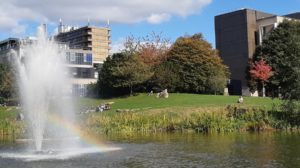Author: Fiona Gleed
 “Did you know it’s Women in Engineering day this Sunday?” the email asked, linking me to a selection of papers authored by women, an archive edition of Municipal Engineering and diversity clips on the Institution of Civil Engineers webpages. And the Institution of Structural Engineers had alerted me too, not least with a Viewpoint from Dawn Bonfield MBE providing a detailed account of the first 100 years of the Women’s Engineering Society.
“Did you know it’s Women in Engineering day this Sunday?” the email asked, linking me to a selection of papers authored by women, an archive edition of Municipal Engineering and diversity clips on the Institution of Civil Engineers webpages. And the Institution of Structural Engineers had alerted me too, not least with a Viewpoint from Dawn Bonfield MBE providing a detailed account of the first 100 years of the Women’s Engineering Society.
So, yes, I knew. But did you?
And did you know that Architecture and Civil Engineering has recently gained a Silver Award through Athena Swan? That Prof Marcelle McManus has been voted Most Inspirational Woman in STEM in the West? Or that Leen Jabban, a postgraduate student in Department of Electronic and Electrical Engineering, has been awarded the Chancellor’s Prize, recognising her academic excellence and her voluntary work with Bath Welcomes Refugees and WESBath.

It was through WESBath that I had the opportunity to meet Leen to record a (very) short clip for a compilation showing how academics and postgraduates here at Bath hope to Transform The Future with our research. The film was screened on 20th June 2019 as part of a celebration of Women In Engineering, linking staff and student networks within the University with local members of the Women’s Engineering Society. Talks followed by Nicola Grahamslaw, a returner to engineering and coordinator of the South West WES cluster, Catherine Milne, an assertiveness trainer, and Andi Adams, a transport planner giving her take on why Women are the Future of the Built Environment. I’ve some further reading to follow up from Nicola Grahamslaw’s talk, not least moving beyond reviews of Invisible Women by Caroline Criado Perez, and will be reflecting on Catherine Fletcher’s recommendations for assertiveness. But it was Andi’s talk that really captured for me why networking matters and how the seemingly random connections we make through life link up to enrich and inform our careers and ourselves. Because Andi talked about something she was passionate about, the sculpture of Barbara Hepworth.


I first encountered Barbara Hepworth’s work through her Winged Figure sculpture on the wall of John Lewis in Oxford Street. But I did not know it was by Barbara Hepworth until a teacher at school talked about her work, and Dame Hepworth herself - a person she knew from her home town of St Ives in Cornwall. I have seen her work at various locations and intervals since; striking, modernist forms, framing voids and views. Earlier this year, visiting the University of Exeter, I turned a corner and encountered Figure for Landscape; a chance meeting, but one that helped to make a strange place seem familiar, begin to make a mental map of a campus I’ll need to know. It also prompted me to seek out more of Barbara Hepworth’s work, returning from holiday via the Yorkshire Sculpture Park.
And on Thursday, I enjoyed learning more, through someone else’s enthusiasm and experience.

Professional networks develop in similar ways. I saw people I knew from Architecture and Civil Engineering: The array of women engineers in the WESBath film included Dr Juliana Holley talking about research mentoring and Naomi Deering, describing her doctoral research on developing and drying fake poo, and the Head of Department, Professor Stephen Emmitt, was at the event – a welcome sign of support and a reminder that non-engineers, men and even those in the intersectional group of men who aren’t engineers can apply to be Associate Members of WES .
After the structured series of talks, we spilled out from the lecture theatre to drinks in the foyer.  I had not previously met many of the other postgraduates featured in the film but the clips provided an introduction as we spotted newly familiar faces and tried to recall each others’ research topics. I spoke to Andi Adams about Barbara Hepworth, and about transport planning. I sought out Nicola Grahamslaw to exchange notes on WES and the Open University and thank her for achieving a momentum locally that should see the cluster grow socially and officially.
I had not previously met many of the other postgraduates featured in the film but the clips provided an introduction as we spotted newly familiar faces and tried to recall each others’ research topics. I spoke to Andi Adams about Barbara Hepworth, and about transport planning. I sought out Nicola Grahamslaw to exchange notes on WES and the Open University and thank her for achieving a momentum locally that should see the cluster grow socially and officially.

And as I headed home, I realised that moving on from Bath will not be breaking away from a network but unfurling it further; developing links between those I know now and those I’m yet to encounter. As Jane Austen wrote, “I really believe I shall always be talking of Bath…”
Respond
